Our approach to raising American Guinea hogs is driven by a deep commitment to sustainability, animal welfare, and responsible farming practices. Our intentional decision to keep a small pig herd size is a reflection of our dedication to preserving and nurturing the natural grazing areas on our farm.
Lots of clean air and sunshine like nature intended
TnF Farms had approximately 3 dedicated acres of carefully fenced pasture, forested areas, and creek bottoms where our pigs roamed freely. This approach allowed them to graze on real, unprocessed food. It also ensures they had access to diverse environments, from sunny pastures to cool forested areas and refreshing creek beds. To further enhance their well-being, we’ve created a man-made sand-bottom wallow. Our American Guinea hogs also had access to a natural spring, allowing them to cool off and enjoy a bit of mud as they pleased.
Our commitment to the welfare of our hogs extends to how we sheltered them. Multiple well-constructed shelters were strategically placed across the pasture, providing our hogs with relief from the weather, be it rain, shine, or wind.
Healthcare for our hogs was a top priority. Regular veterinary maintenance ensured that they were in optimal health, and we took a proactive approach to disease prevention, minimizing needs for antibiotics or hormones.
Challenging stereotypes
It’s essential to challenge common misconceptions about pigs. While they are often stereotyped as “dirty” and “mean,” these traits are not inherent but rather situational. Pigs can be clean animals if they haven’t been rooting in the soil or cooling off in mud. They also do not defecate where they sleep. American Guinea hogs, in particular, are known for their mild temperament, and ours were no exception. Regular interaction with our hogs fostered a bond that makes them behave more like outside dogs, further challenging stereotypes and emphasizing their amiable nature.
At TnF Farms, our approach to raising American Guinea hogs is a testament to our values of sustainability, compassion, and ethical farming practices. We take great pride in providing our hogs with a nurturing and natural environment where they can thrive and lead contented lives.
- Pasture and forest vegetation including roots, tree nuts and fruit
- Wildlife and insects living in the grass and streams
- Hay
- Fruits and vegetables year round, pumpkin and squash in the fall
- Supplemental freshly milled mineral blend from a local feed store
- The American Guinea hog is a Heritage breed
- Smaller, black pigs with a good temperament
- Adults can grow to 400 pounds
- Great tolerance for the Florida weather
- Flavorful, tender, darker pork
- Excellent for bacon, charcuterie, sausages and lard
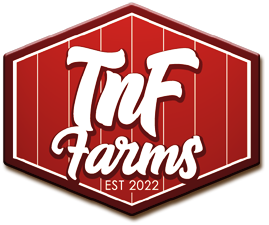
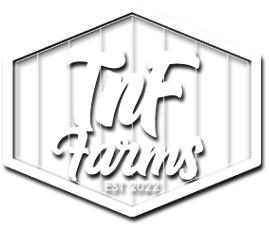
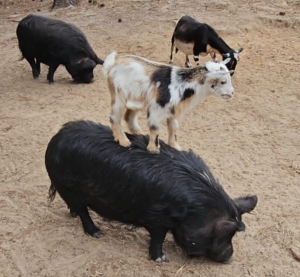
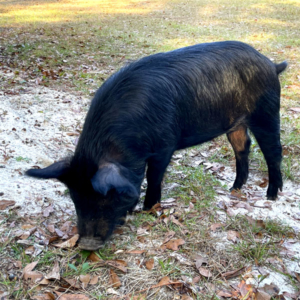
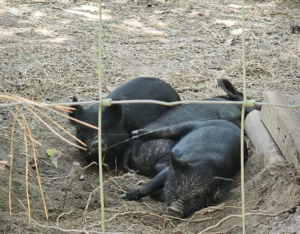
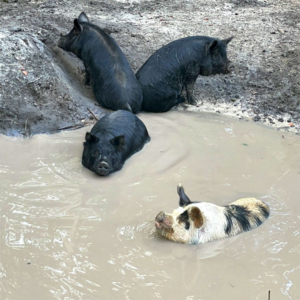
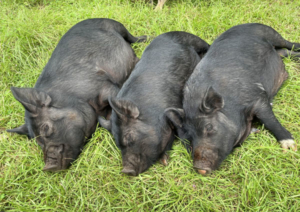
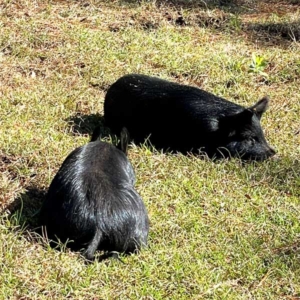
American Guinea For Quality Meat
/in American Guinea Hogs, Farm Animals, Homesteading/by FaithIf you’re looking to embark on a rewarding journey into small-scale, sustainable livestock farming, consider raising American Guinea Hogs. These unique heritage pigs offer not only a taste of history but also a delectable source of meat. In this post, we’ll discuss some of our experiences so far with American Guinea Hogs, their characteristics, benefits, and how to raise them for flavorful pork.
A Heritage Breed Worth Preserving
/in American Guinea Hogs, Farm Animals/by FaithNestled in the rich tapestry of American agriculture lies a remarkable treasure – the American Guinea Hog. This diminutive yet hardy breed represents a living link to the country’s agrarian past, serving as a testament to the importance of heritage conservation in modern farming.
Registered Livestock Pros and Cons
/in American Guinea Hogs, Farm Animals, Farmer's Market, Homesteading, Nigerian Dwarf Goats/by TimWhen it comes to raising livestock, whether for meat, milk, or other products, farmers often face a choice between registered and non-registered animals. Registered livestock, which are typically associated with purebred or pedigree breeds, come with their own set of advantages and disadvantages. In this blog post, we’ll explore the pros and cons of raising registered livestock to help farmers make informed decisions about their animal husbandry practices. TnF Farms has both registered and unregistered livestock. The animal’s purpose is dependent on whether or not it is registered. TnF Farms is also a member of the American Guinea Hog Association.